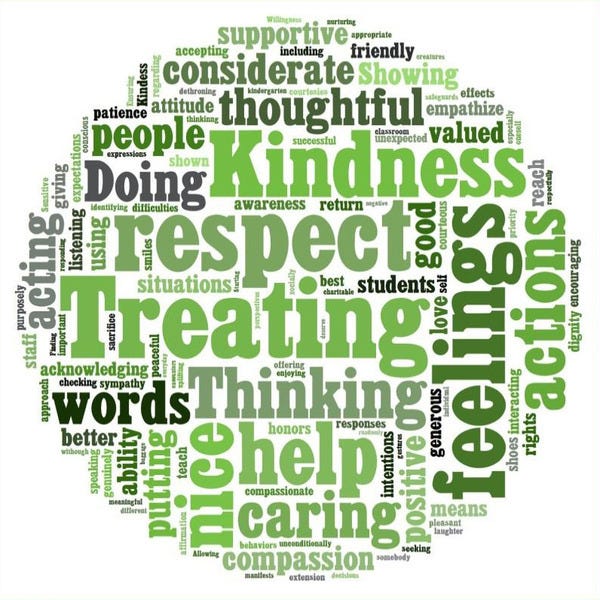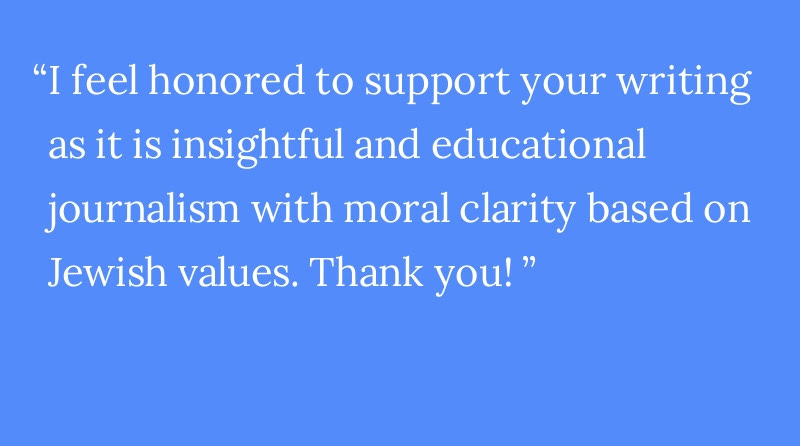About the Mensch•Mark Series
The Talmudic tractate Avot, 6:6 provides a roadmap as to how to live an ethical life. This passage includes 48 middot (measures) through which we can “acquire Torah.” See the full list here. For each of these days of reflection, running from the first of Elul through Yom Kippur, I’m highlighting one of these middot, in order to assist each of us in the process of soul searching (“heshbon ha-nefesh”).
For the New Year, give a free or paid subscription to someone you love - or even just like. Or maybe not like so much. There’s no better way to stay connected during this most Urgent Jewish Now.
Today’s Middah:
Limiting One's Involvement in Worldly Concerns-
Middah Miyut Derech Eretz
URJ’s Take
Text
"The former generations made the study of Torah their regular concern and their daily work their occasional concern, and they succeeded in the one and in the other. The recent generations have made their daily work their regular concern and their study of Torah their occasional concern, and they have succeeded neither in the one nor in the other." (Babylonian Talmud 35b)Commentary
This text summarizes the essential issue of miyut derech eretz—minimizing involvement in worldly concerns so that one is able to devote more attention to the study of Torah.The medieval commentator Rashi explained that "involvement in social, communal and civic affairs can become an almost full-time preoccupation, allowing little time for growth in Torah." The commentary Lechem Shamayim denotes that miyut derech eretz refers to the sciences. The commentary teaches that one must have some knowledge of math, geometry, biology, earth sciences and the like, but one should understand that they are only tools to understand certain areas of Torah, but secondary to the Divine Torah." (The Pirkei Avos Treasury, ArtScroll p.415)
A student approached Rabbi Ishmael and asked, "May one like myself, who has studied the entire Torah, study Greek wisdom? Rabbi Ishmael cited a biblical verse as a response, 'This book of Torah shall not depart out of your mouth, but you shall meditate upon them day and night.'" (Joshua 1:8). As further explanation Rabbi Ishmael said, "Go and find an hour that is neither day nor night, and study Greek wisdom then." (The Book of Legends Sefer Ha-Aggadah 407:45)
Not all rabbis saw this as a black and white issue, either Torah or worldly concerns. In fact, Rabbi Judah ben Ilai spoke in favor of both study of Torah and secular involvement. He said,
"Anyone who makes words of Torah his or her primary concern and worldly matters secondary will be made primary in the world-to-come. But anyone who makes worldly matters primary and words of Torah secondary will be made secondary in the world-to-come." But he also taught, "Anyone who does not teach his or her child a trade it is as though the child has been taught to be a thief." Additionally, Rabbi Judah ben Ilai said, "Work is primary in importance, honoring the one who engages in it." (The Book of Legends Sefer Ha-Aggadah 408:56)
On first reading it seems that Rabbi Judah cannot make up his mind, on the one hand he stresses that Torah study should be one's primary concern, yet he then teaches that work is primary in importance, honoring the one who engages in it. The midrash does not end with this contradiction, but continues, explaining that Rabbi Judah was actually counseling a middle course. A parable is cited as explanation,
"A highway runs between two paths, one of fire and the other of snow. If a person walks too close to the fire, that person will be scorched by the flames, if too close to the snow, the individual will be bitten by the cold. What is the person to do? The individual is to walk in the middle, taking care not to be scorched by the heat nor bitten by the cold." (The Book of Legends Sefer Ha-Aggadah 408:56)
MY TAKE: The Most Sacred Task (1999)
What does it mean to be a professional human being?
A letter to my congregants:
Among the many questions I face, one that comes up from time to time is, “Just what do you do?” That the question usually comes out of the mouth of someone under 12 is inconsequential, for we know that kids usually ask questions that many adults wish they could ask. As a public service, here’s a partial response.
I don’t intend to give a detailed log here, in part because no two days are exactly alike. The job is so filled with variety and serendipity; a hidden blessing around every corner. Although my commute is among the shortest around, on any given day I navigate entire worlds of emotions and scale Himalayan challenges.
The essence of my work is to be fully human – to enable that spark of divinity in me to reach out to the image of God that resides in you, and thereby to connect us both to a life of meaning and transcendence. But doing that with so many, often in the same compressed timeframe, is a supreme challenge. Daily, I juggle dozens of lives in the air. Since each one is of equal, and infinite importance, I’ve got to respond as if each encounter is the most important one I’ll have all day -- it often is for that other person, so it’s got to be for me. Of course that’s all but impossible to pull off, but most people are extremely understanding as to my limitations. I am less so. But at the end of the day, I measure how I’ve done by how human I’ve been at each encounter, not by the quantity of lives I’ve touched.
Part of my being a professional human being is accomplished through study, prayer and scholarship. I try to take some time during the busy week to develop my inner life. I read newspapers and magazines voraciously, both off and on-line, and try as much as I can to read books. Most of the books I read have some potential tie-in to my teaching and my sermons; there too the line between personal and professional is blurred. It is a pleasure for me to read, but it is not what most would call “pleasure (i.e. non work-related) reading.” Rarely do I get to lay my hands on a good trashy novel. Who needs that, I suppose, when I can just pick a Bible and turn to the saga of King David? I also try to spend a part of each week writing. Often that occurs on Mondays, my “official” day off, but at times on other days as well. In fact, there really is no day off, because I am always available for important pastoral needs on Mondays, and because the writing is really an important part of my work. It feeds my other work and is fed by it.
I work very hard at finding meaning in prayer. If I didn’t, I’d be cheating you, and myself. Sometimes I succeed, sometimes I don’t, but am always struggling and trying to grow. I would want my rabbi to do the same, and dream of the day when all of my congregants will also try to stretch their souls to the limit. When I am teaching I try to be a learner too, always open to discovering new truths from my research and the students’ response.
There’s lots of administrative stuff too, including letters and phone calls and, increasingly, e-mailing congregants and college students, and team building and program planning among our staff and volunteers.
But there is one final aspect to my job that I find most essential: Modeling. It’s my job to model, as best I can, what I think a Jew should do and be. That means above all greeting everyone with a smile, looking at the half-full cup and then both filling it and drinking from it, without worrying so darn much about the empty half; reaching out to young and old, not robbing banks, and exploring how to use Jewish values and observances as a means to personal and communal growth. But it doesn’t mean being perfect. To do my job correctly, in fact, I’ve got to be imperfect – because I also have to model how to be humble and grow from one’s mistakes.
Finally, how could I set an example for you if I neglected my own health and my family? So part of my job is to set aside ample time to be fully present with them. And since the lines between personal and professional are so blurry, it is important for a rabbi, more than almost anyone else, to spend a few significant chunks of time out-of-touch with most of the congregation. Many take Sabbaticals, something I hope you will insist that I do some day (spoiler alert; it never happened, even when I asked). All take significant vacation time in the summer. When a job takes someone from his family every day of every weekend, plus almost every holiday, there must come a point where the batteries have to recharge.
That point is right now. While you are reading this, I’m most likely on a beach somewhere (Unfortunately, I don’t get frequent flyer miles for all those Himalayan spiritual challenges I scale). You won’t hear from me while I’m gone, although I will monitor voice mail from time to time – but your pastoral and other needs will be covered. And that’s how it should be. As a professional human being, I’ll be working very hard for you while I’m frolicking on the beach, engaged in my most sacred task: being human.



No comments:
Post a Comment